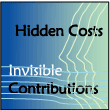 Between 2003 and 2008 the Hidden Costs, Invisible Contributions (HCIC) research program sought to create a deeper understanding of the place in society of ‘dependent’ adults, specifically older adults and adults with chronic illness or disability.
Between 2003 and 2008 the Hidden Costs, Invisible Contributions (HCIC) research program sought to create a deeper understanding of the place in society of ‘dependent’ adults, specifically older adults and adults with chronic illness or disability.
With funding from the Social Sciences and Humanities Research Council as part of a Major Collaborative Research Initiative, our work was set within a multidisciplinary context and emphasized the application of multiple methodologies.
Over the tenure of HCIC we:
- revealed the hidden costs of care to adults with care needs
- made visible the contributions made by older adults and the role of contributions in aging well
- identified and assessed the efficacy of policies and programs in mediating costs of care and facilitating contributions
Key accomplishments
- We documented the significant consequences of caring for adults with chronic illness/disability: discovering unprecedented severity of consequences for spouses of younger veterans returning from peace-keeping missions with acute-onset, severe disabilities; revealing employment-related consequences with lifelong implications for earnings from jobs and future pension income; demonstrating the importance of accounting for growing cultural diversity in Canadal and analyzing the role of values and beliefs underlying caregiving policy.
- We demonstrated that, at the aggregate, older adults and adults with disability remain productive and engaged, making significant contributions to their families, communities, and society despite assumptions of ‘dependency’.
- We integrated the discoveries described above, leading to a more holistic consideration of the ‘work of families’ rather than perpetuating the segregation of family work from paid work.
- By examining disability across the adult life course we began integrating knowledge across gerontology and disability studies literatures and clarifying the relative importance of age and disability for caregiving and for aging/living well.
- We learned about the ways in which structural, social and service environments in communities influence aging well.
- Conceptual work through HCIC led to the development of critical human ecology theory, which brings a more critical perspective to our focus on contexts of aging.
- We developed a strong collaborative model, conducted research on its efficacy, documented the core principles, trained the next generation of scholars, and strengthened partnerships with policy and practice communities.
Publications
We published over 120 journal articles, book chapters and reports in a wide variety of journals across the social sciences and humanities. Most notably we produced:
- Rural ageing: A good place to grow old? edited by N. Keating and published by Policy Press (2008). Chris Phillipson, Professor of Applied Social Studies and Social Gerontology at Keele University stated “This volume brings togeter a distinguished group of researchers working in the field of rural gerontology and gives an excellent balance between theoretical perspectives and empirical findings. It challenges conventional stereotypes of rural ageing and provides important lessons for policy-makers and practitioners alike.”
- The Silvering Screen written by Sally Chivers and published by University of Toronto Press (2011) is the first-ever sustained discussion of old age and disability in cinema.
- Hidden Costs / Invisible Contributions of Caregiving, a special issue of the Canadian Journal on Aging (2007).
- Wounded Veterans, Wounded Families report
- “I wish that I could just have a break”: Consequences of supporting adults with disabilities report
- Employed family/friend caregivers to adults with disabilities: Impact of public policies on caregivers’ costs report
- Financial compensation policies for caregivers Final Report and Executive Summary
- Policy profiles on caregiver compensation policies (2004): Australia,Canada, France, Germany, Israel, Netherlands, Norway, Sweden,United Kingdom, United States
- Masks & mirrors: From autobiographical reflection to unmasking interdisciplinary collaboration by C. Roy and J. Eales (2010) in Reflective Practice, vol 11 (4), 433-450.
- Annotated bibliography contextualizing aging and disability
Student Theses
We provided research training opportunities to many graduate students, nine of whom completed their theses as part of HCIC.
- Chelsea Dunlop (MSc 2010). Contributions of older adults: Perspectives from researcher and stakeholder groups. University of Alberta: Janet Fast, supervisor.
- Insaf Hag-Mousa (PhD 2008). Moving on: Ugandan families and HIV/AIDS. University of Alberta: Norah Keating, supervisor.
- Shireen Surood (PhD 2008). The impact of culture on the utilization of western health services by aging South Asian Canadians. University of Calgary: Daniel Lai, supervisor.
- Linda Cook (PhD 2007). Mental illness: Family/friend caregiver costs. University of Alberta: Norah Keating, supervisor.
- Bonnie Lashewicz (PhD 2006). Equity among equals: Sibling views of fairness in parent care and parent asset distribution. University of Alberta: Norah Keating, supervisor.
- Sherry Ann Chapman (PhD 2005). Aging well: Constructing identity with special things. University of Alberta: Norah Keating, supervisor.
- Jason Walker (MSc 2005). Still work-life 2002: A portrait of employed eldercare providers in Canada. University of Alberta: Janet Fast, supervisor.
- Lisa Tay (MA 2005). Financial compensation initiatives for caregivers: Changes over time and drivers of change in four countries. Dalhousie University: Janice Keefe, supervisor.
- Jennifer Colepaugh (MA 2004). Lessons to be learned: A gender-based analysis of direct compensation policies for informal caregivers in Australia, Germany and the United Kingdom. Mount Saint Vincent University: Janice Keefe, supervisor.
Partnerships
Our close collaboration with policy and practice partners facilitated knowledge exchange that contributed to the debate around key policy issues. Selected examples include:
- participating in the evaluation of public programs to support family/friend caregivers
- providing evidence at critical junctures in policy debates to inform political decisions on aging
- hosting a policy workshop to bring together federal policy analysts and bureaucrats with HCIC researchers to facilitate uptake of research findings
- providing evidence, advise and assistance for development of practice principles for social workers, occupational therapists, home and continuing care service providers, physicians and voluntary organizations.
